Diplomacy | Anno 1404 Wiki
in:
Diplomacy, Guides
Contents
- 1 Introduction
- 2 Diplomacy Screen
- 2.1 Reputation
- 2.2 Relationship Wheel
- 2.3 Diplomatic Buttons
- 3 Diplomatic Statuses
- 3.1 War
- 3.2 Peace Treaty
- 3.3 Trade Treaty
- 3.4 Alliance Treaty
- 4 Tributes
- 5 Ingratiate and Intimidate
- 6 Request Auxiliary Fleets
- 7 Convert honour and gold
- 8 See also
Introduction[]
Diplomacy is used in Anno 1404 to ask for help, demand gold, befriend, or anger other characters. There are three types of characters you can engage in diplomatic relations:
- Mentors: They’re always at peace with you and serve as trading partners, quest givers, and general helpers.
- Computer players: They’re trying to settle and expand to more islands just as you are. They are all your opponents technically, although some are very friendly as pose no real threat but some are very vicious and will attempt to kill you whenever possible.
- Hassan ben Sahid: The wild card character who at first is against everyone and attacks everyone on sight, but he can eventually be befriended and made a permanent ally.
Diplomacy Screen[]
|
The Diplomacy menu is where you interact with the other characters, such as your mentors Lord Richard Northburgh, Grand Vizier Al Zahir, and Giacomo Garibaldi (if playing Venice), among other characters diplomatically. To access the diplomacy menu, click the button on the lower right with the two pawns or press the F7 key. |
Reputation[]
Your diplomatic status with AI players depends on Reputation points. How you gain or lose Reputation points depends on the computer player in question. You generally get Reputation points by completing quests, but certain players like Cardinal Lucius get mad when you help people like Al Zahir. You also get Reputation occasionally when the AI players notice that you are doing well by growing your city quickly, although reaching the Noblemen stage can greatly anger the hard computer players because they feel threatened by you.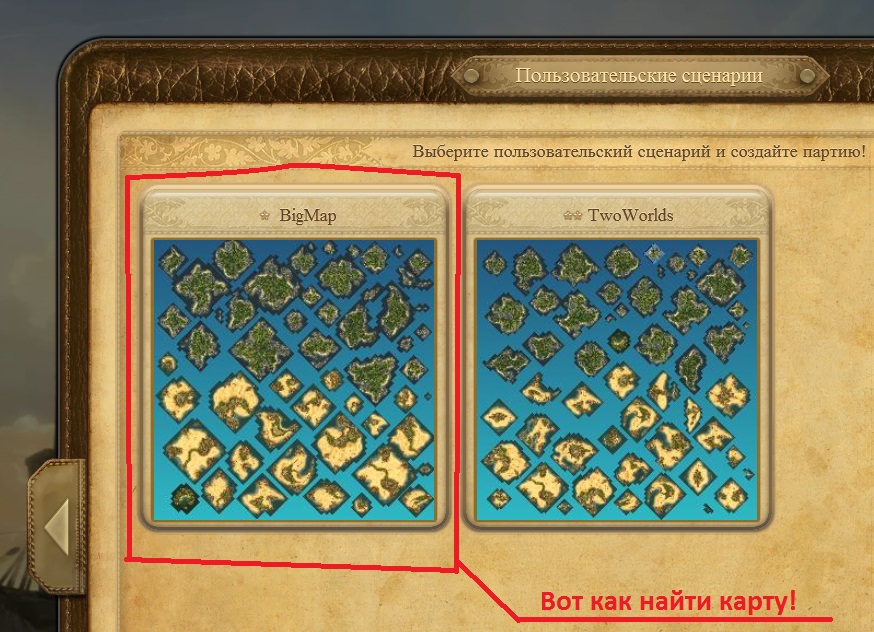 You lose points when players notice you aren’t doing as well as they are, but some of the easy and medium AI don’t care so much about your progress or lack thereof.
You lose points when players notice you aren’t doing as well as they are, but some of the easy and medium AI don’t care so much about your progress or lack thereof.
Tip: You only have a Reputation meter with other computer players and Hassan ben Sahid. Since you’re always allied with the mentors, you don’t have any reputation meter for them.
Relationship Wheel[]
The relationship between any two parties can be viewed by clicking one of their pictures. That character will then be in the center of the wheel and the relationships will be visible for each character. For instance, if you want to know how Guy Forcas stands will all other players, you can click on his portrait and then there will be either red, yellow, or white lines connecting him to all other players. Red means they don’t like each other and war has started or will start shortly, white/gray means they are fairly ambivalent toward each other and can form a peace treaty, yellow means they moderately friends and can form a trade treaty, and green means they are strong friends and can form an alliance.
Diplomatic Buttons[]
The buttons on the left of the name of the character cancel any current treaty you might have with a player (such as Peace treaty, Trade treaty, or Alliance) and reduces Reputation. You can also declare war at any time, which will lower your reputation to zero and immediately cancel all treaties.
The buttons on the right of the name try to take the relationship to the next higher diplomatic level with the character (War to Peace, Peace to Trade treaty, Trade treaty to Alliance).
The buttons under the characters name are the Tribute, Ingratiate/Intimidate, Request Fleet, Request quest (when playing Venice), and Honour/Gold Exchange buttons depending on the particular character. If the current character is oneself, the unlocked content, medals, and achievements can be seen.
Diplomatic Statuses[]
War[]
The War state is when you are in the red area of the reputation scale. The reputation needed to secure Peace with the AI, depends on their nature.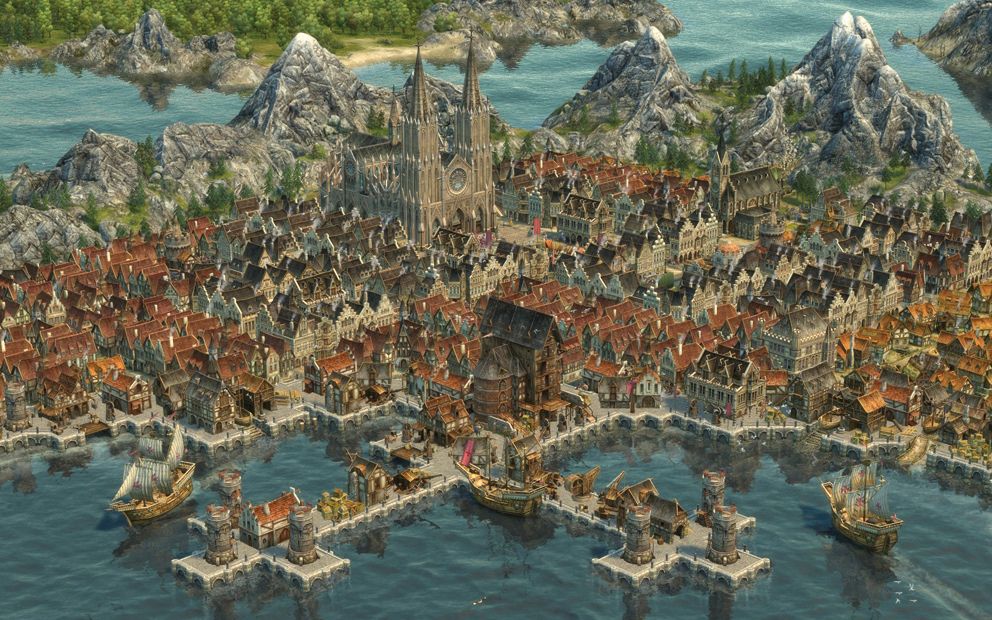 Amateurs like Leif or Hildegard only require 10 points in reputation to secure peace, but Willem, another easy AI, (in v.1.1) requires 30 points in reputation (with the addon, this has been changed to 20 points). Warmongering Computer players require a higher status than merchants or other types of computer players.
Amateurs like Leif or Hildegard only require 10 points in reputation to secure peace, but Willem, another easy AI, (in v.1.1) requires 30 points in reputation (with the addon, this has been changed to 20 points). Warmongering Computer players require a higher status than merchants or other types of computer players.
Peace Treaty[]
The Peace Treaty state is the grey area of the Reputation scale. Declaring war with the Declare War button will cause your Reputation to drop to 0. With high enough Reputation, the player can attempt to get a Trade Treaty.
Trade Treaty[]
The Trade Treaty status is the yellow area of the Reputation scale. With a Trade Treaty, the AI will call on your cities with its fleet and will allow your ships to visit its ports to buy the items it has for sale. If a Trade Treaty is canceled, the Reputation will drop to the Peace Treaty status. With high enough Reputation, an Alliance Treaty can be concluded.
Alliance Treaty[]
An Alliance Treaty status is the green area of the Reputation scale. With an Alliance Treaty, you will get the special quests required for the Achievements (such as Willem van de Mark’s ‘A Miracle in the Sand’). Some NPC’s are harder to keep an alliance with (especially Sir Gavon Langton). With an alliance treaty one will get aid from the allied npc in a war against another one.
With an Alliance Treaty, you will get the special quests required for the Achievements (such as Willem van de Mark’s ‘A Miracle in the Sand’). Some NPC’s are harder to keep an alliance with (especially Sir Gavon Langton). With an alliance treaty one will get aid from the allied npc in a war against another one.
Tributes[]
Tributes can be given to, or requested from, AI players. Each has its own probability of success with requests and offers of 750, 1,500, and 3,000 gold (these numbers increase as the game progresses). You lose Reputation if your attempt fails.
Ingratiate and Intimidate[]
When working with the AI characters, you can ingratiate or intimidate them to gain or lower Reputation. The icons are the smiley face for ingratiate and the frown face for intimidate. Mousing over tells the probability of success for each action. Each AI character has their own amount these work. The probability and effect can be improved with Diplomatic Tact, a level three Grand Vizier Attainment. If an attempt to ingratiate fails, Reputation is lost. Failures in intimidation don’t affect Reputation.
If an attempt to ingratiate fails, Reputation is lost. Failures in intimidation don’t affect Reputation.
Request Auxiliary Fleets[]
Lord Northburgh and the Grand Vizier have auxiliary fleets that you can request in exchange for some Honour and having a probability of success. These fleets are sent to your island and the ships become yours for the duration of the game.
Convert honour and gold[]
It is possible to exchange gold for Honour with Lord Northburgh and the Grand Vizier. There are 3 amounts: 3,125 gold for 75 Honour, 6,250 gold for 150 Honour, and 12,500 gold for 300 Honour. For more information, see «Buying» Honor.
You can also request a «loan» which does the opposite: trades Honour for gold. There are 3 exchange rates: 2,500 gold for 75 Honour, 5,000 gold for 150 Honour, and 10,000 gold for 300 Honour.
See also[]
- Diplomacy achievements
Community content is available under CC-BY-SA unless otherwise noted.
Anno 1404 — Tipps und Komplettlösung: Diplomat-Szenario
Ausgestattet mit 20.000 Goldmünzen und etwas Baumaterial werden Sie auf dieser Karte von Lord Northburgh losgeschickt, um sich den Titel «Diplomat» zu verdienen. Damit die Mission erfolgreich ist, müssen Sie folgende Aufgaben erfüllen: Die Sultansmoschee bauen, weltweit 5.000 Gesandte ansiedeln und fünf Aufträge des Sultans erledigen. Angesichts des ausreichend hohen Geldbetrages werden Sie in der frühen Aufbauphase weniger finanzielle, wohl aber ressourcenbedingte Schwierigkeiten bekommen. Kaufen Sie daher möglichst bald Werkzeug und Holz bei Northburgh, damit die Lager sich sogleich wieder füllen können.
Anno 1404 — Komplettlösung: Übersichtskarte zum Szenario «Diplomat»
Quelle: PC Games
Rollentausch
Da sich die Aufgaben allesamt im Orient abspielen, kommt diesem in dieser Partie die größere Bedeutung zu und die europäische Insel wird eher als Rohstofflieferant für Ihre Nomaden und Gesandten dienen.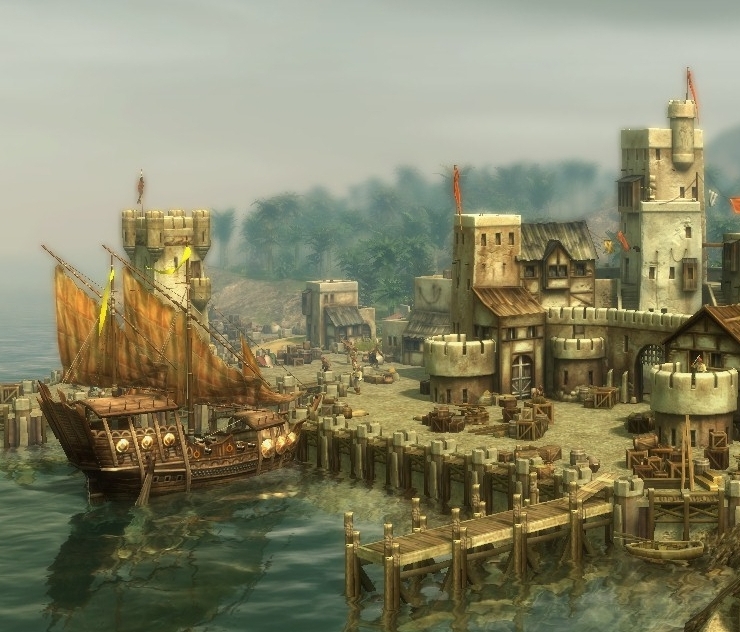 Daher ist es auch grundsätzlich nicht notwendig, dass Adelige in Ihrer Stadt einziehen. Hilfreich ist es aber dennoch, da Sie für eine wachsende Siedlung Ruhm erhalten, den Sie brauchen, um alle sechs Stufen des Ansehens beim Wesir zu durchlaufen. Und unterhalb der letzten Stufe können Sie die Sultansmoschee leider nicht errichten.
Daher ist es auch grundsätzlich nicht notwendig, dass Adelige in Ihrer Stadt einziehen. Hilfreich ist es aber dennoch, da Sie für eine wachsende Siedlung Ruhm erhalten, den Sie brauchen, um alle sechs Stufen des Ansehens beim Wesir zu durchlaufen. Und unterhalb der letzten Stufe können Sie die Sultansmoschee leider nicht errichten.
Inselwahl
Wählen Sie am besten gleich die Insel südwestlich von Northburghs Insel [1] und richten Sie sich dort ein. Al Zahirs Hafen [2] befindet sich praktischerweise gleich südwestlich Ihrer Siedlung. Einerseits sollten sie früh expandieren, andererseits sollten sie zuvor eine funktionierende Werkzeugproduktion zum Laufen bringen, da die Besiedlung des Orients sonst allzu träge von statten geht. Denn schließlich kostet jedes Nomadenzelt im Gegensatz zum europäischen Pendant nicht nur Holz, sondern auch eine Einheit Werkzeug. In der Wartezeit müssen Sie jedoch nicht untätig bleiben. Bauen Sie einzelne Kontore auf später nützlichen Inseln, wie der horizontal liegenden länglichen im Osten und der größeren östlich der Korsarenfestung.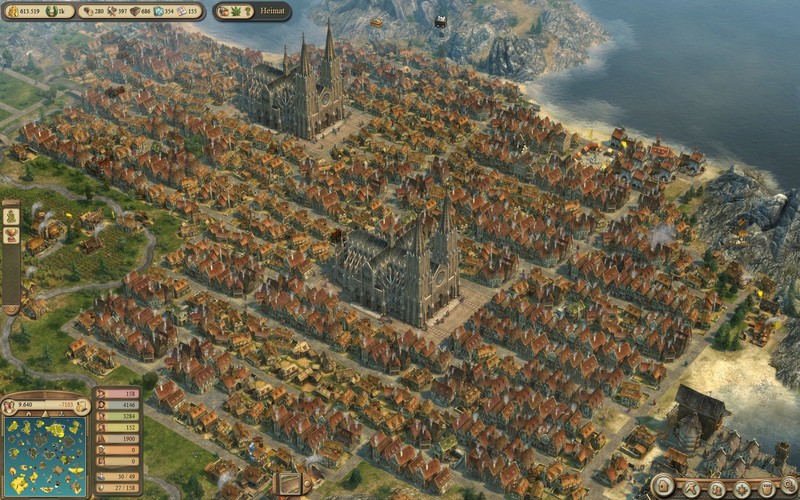
Das hat den Vorteil, dass Sie später nicht Ihren guten Ruf gefährden müssen, indem Sie auf einer bereits besiedelten Insel ein Kontor bauen. Was jedoch nicht bedeutet, dass Sie nicht an Ansehen verlieren werden, wenn einer Ihrer Mitspieler es auf ein bestimmtes Eiland abgesehen hat. Mit einer funktionierenden Werkzeugproduktion im Rücken bauen Sie nun Ihre nahöstliche Siedlung auf. Hierfür eignet sich die große Insel südöstlich Ihres Standorts [3] am besten. Die Ressourcen Seide und Farbe für die Teppiche, die den Aufstieg Ihrer Nomaden zu Gesandten ermöglichen, finden Sie östlich [4] und südöstlich [5] Ihrer orientalischen Siedlung. Da die Versorgung deutlich einfacher ist, wenn ihre Bevölkerung auf möglichst wenigen Inseln beheimatet ist, sollten Sie so bald wie möglich sämtliche Produktionen auslagern, um auf der Siedlungsinsel Platz zu schaffen. Zu Beginn kostet eine derartige Infrastruktur in der Regel allerdings zu viele Ressourcen; übereilen Sie es daher nicht.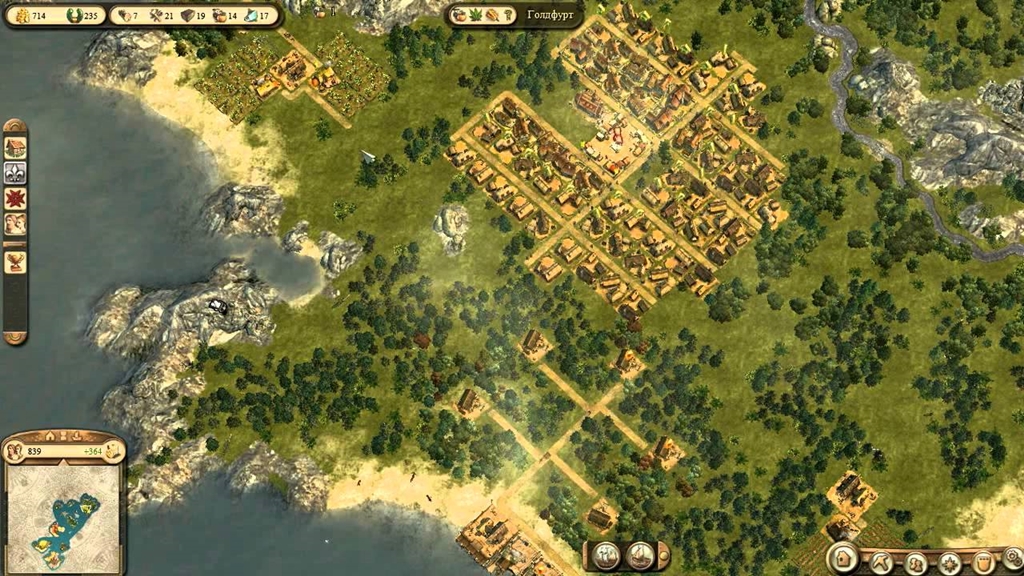 Sie müssen ohnehin zwei Inseln besiedeln, da keine groß genug ist, um 5.000 Gesandte zu beherbergen.
Sie müssen ohnehin zwei Inseln besiedeln, da keine groß genug ist, um 5.000 Gesandte zu beherbergen.
Dies bedeutet ebenfalls, dass Sie deutlich mehr Schiffe brauchen. Falls Sie sich nicht mit Feintuning aufhalten wollen, sogar die doppelte Anzahl. Bei aller Aufbauarbeit sollten Sie natürlich Ihre Verteidigung nicht völlig vernachlässigen, weshalb es wiederum gilt, die europäische Insel auf die Zivilisationsstufe der Patrizier zu bringen. Andernfalls kann sich schließlich kein Waffenschmied in Ihrer Stadt niederlassen. Denn auch wenn Ihre Aufgaben keine militärische Komponente enthalten, werden Sie sich nicht auf die Friedfertigkeit Ihrer Mitspieler verlassen können. Auf Landstreitkräfte können Sie erfahrungsgemäß jedoch verzichten. Der Aufwand einer Invasion ist zu groß, als dass Sie einer der Kontrahenten überraschend erobern könnte.
Verteilungsstreit
Leider sind die Inseln für drei Spieler etwas knapp bemessen und so ist es wahrscheinlich, dass sich auf Ihren Inseln bald fremde Kontore finden werden, ein Umstand, den Ihre Mitspieler mit begehrlichen Anspielungen über den rechtmäßigen Besitz untermalen. Greifen Sie feindliche Kontore jedoch nicht präventiv an. Früher oder später werden sich die beiden Computergegner Guy Forcas und Sir Gavin Langton aller Wahrscheinlichkeit nach gegenseitig beharken und Sie haben dann erst einmal etwas Ruhe.
Greifen Sie feindliche Kontore jedoch nicht präventiv an. Früher oder später werden sich die beiden Computergegner Guy Forcas und Sir Gavin Langton aller Wahrscheinlichkeit nach gegenseitig beharken und Sie haben dann erst einmal etwas Ruhe.
Rohstoffknappheit
Damit Ihre Gesandten rundum glücklich sind, müssen Sie ihnen Kaffee zur Verfügung stellen. Allerdings gibt es nur drei Inseln, auf denen die Bohnen ohne Weiteres gedeihen [6], wobei die südlichste der einzige Ort ist, der Rosenzucht erlaubt. Falls Sie keines dieser Eilande erwischen, kann bei Al Zahir Saatgut gekauft werden; die relevante Währung ist natürlich Ruhm. Sollten Sie nicht ausreichend davon zur Verfügung haben, können Sie versuchen, ein unbebautes Fleckchen einer bereits besetzten Insel zu erhaschen. Allerdings sollte der betreffende Besitzer weder militärisch übermächtig verstimmt sein. Wie gut die Herrschaften auf Sie zu sprechen sind, sehen Sie ebenfalls im Diplomatie-Menü.
Diplomatie
Da Sie sich mit Blick auf Ihre Aufgaben mit allen Mitspielern vertragen möchten, lohnt es sich auf jeden Fall, die Errungenschaft «Siegel des Regenten» freizuschalten.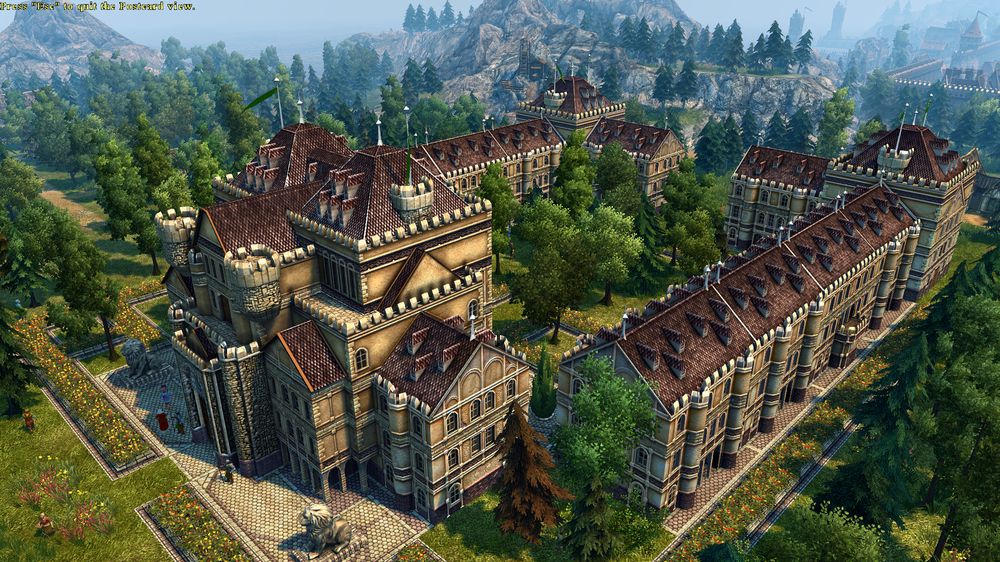 Damit erhöht sich die Wahrscheinlichkeit, dass Ihre Versuche, sich einzuschmeicheln, von Erfolg gekrönt sind. Bleiben Sie des Weiteren in Konflikten nach Möglichkeit neutral und konzentrieren Sie sich auf das Kartenziel.
Damit erhöht sich die Wahrscheinlichkeit, dass Ihre Versuche, sich einzuschmeicheln, von Erfolg gekrönt sind. Bleiben Sie des Weiteren in Konflikten nach Möglichkeit neutral und konzentrieren Sie sich auf das Kartenziel.
Zahme Korsaren
Da es sich um ein Szenario mittlerer Schwierigkeit handelt, ist die Bedrohung durch Piratenangriffe moderat. Eine günstig ankernde Eingreiftruppe von zwei kleinen Kriegsschiffen reicht im Grunde aus, um die Handelsrouten zu sichern. Für weiter entfernte Angriffe empfiehlt sich das Flaggschiff samt Geschwindigkeitsupgrade. Nach einigen Salven brechen die Übeltäter ihre Angriffe in der Regel ab.
Spezial-Gebäude
Ihre Insel für die Indigoproduktion im Südosten ist zwar weit von Ihrer Hauptinsel entfernt, dafür erhalten Sie Zugang zum Gelehrten Ibn al Hakim. Dieser lebt im Süden der Insel und stöbert für den Obolus von ein paar Datteln und etwas Milch in seinen Archiven. Mit etwas Glück fördert er dabei praktische Upgrades zu Tage, die beispielsweise die Produktivität mancher Anlagentypen erhöhen.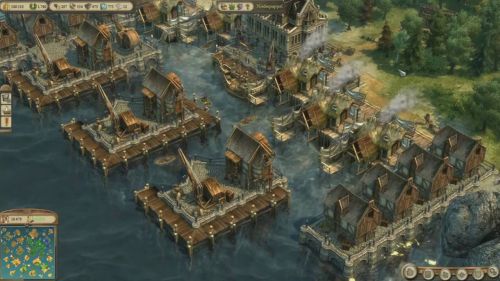
Sultansmoschee
Zu diesem Prunkbau gibt es nicht sehr viel zu sagen, abgesehen davon, dass er sehr teuer ist. Da Sie mindestens 5.000 Gesandte ansiedeln müssen, müssen Sie sich um den Bau allerdings keine Sorgen machen. Eine Wirtschaft, die derart viele anspruchsvolle Genossen versorgen kann, hat auch mit solchen Bauwerken keine Schwierigkeiten. Bauen Sie das Gotteshaus aus diesem Grund aber unbedingt erst, nachdem das Bevölkerungsziel erreicht ist. Andernfalls erhöhen Sie unnötig den Schwierigkeitsgrad des Szenarios.
Von
Thomas Wilke
Seite 1
Anno 1404 — Tipps und Komplettlösung: Einleitung & Inhaltsverzeichnis
Seite 2
Anno 1404 — Tipps und Komplettlösung: Kurfürst-Szenario
Seite 3
Anno 1404 — Tipps und Komplettlösung: Diplomat-Szenario
Seite 4
Anno 1404 — Tipps und Komplettlösung: Heerführer-Szenario
Seite 5
Anno 1404 — Tipps und Komplettlösung: Baumeister-Szenario
Seite 6
Anno 1404 — Tipps und Komplettlösung: Gildenmeister-Szenario
Seite 7
Anno 1404 — Tipps und Komplettlösung: Imperator-Szenario
Seite 8
Bildergalerie zu Anno 1404 — Komplettlösung: PC Games geleitet Sie durch alle Szenarien
nächste Seite nächste Seite nächste Seite nächste Seite nächste Seite nächste Seite nächste Seite
zur Galerie
zur Startseite
Abd-ar-Razzaq al-Samarkandi |
|
1413-1482 |
CV |
XPOHOCPROJECT INTRODUCTIONCHRONOS FORUMCHRONOS NEWSCHRONOS LIBRARYHISTORICAL SOURCESCVINDEXGENEALOGY CHARTSCOUNTRIES AND STATESETHNONYMSRELIGIONS OF THE WORLDHISTORICAL ARTICLESTEACHING METHODOLOGYSITE MAPAUTHORS OF CHRONOSRelated projects:RUMYANTSEV MUSEUMDOCUMENTS OF THE XX CENTURYHISTORICAL GEOGRAPHYRULERS OF THE WORLDWAR OF 1812WORLD ISLAVYETHNOCYCLOPEDIAAPSUARARUSSIAN FIELD |
Abd-ar-Razzaq al-Samarkandi Abd Ar-Razzak (1413-1482) — Samarkand Central Asian historian. + + + Abd-Ar-Razzak, Samarkand (1413-1482) — Central Asian historian. Born and Z. I. Yampolsky. Baku. Soviet Historical Encyclopedia. In 16 volumes. — M .: Soviet Literature: MITT, vol. 1, M.-L., 1939, p. 59; Quatremere Et. M. Notice de Abd-ar-Razzaq al-Samarkandi, Kamal ad-Din ibn Jalal ad-Din Ishaq P. V. Shlykov. Russian Historical Encyclopedia. T. 1. M., 2015, p. 28. Compositions: Abd-ar-Razzak Samarkandi. Literature:Materials on the history of Turkmens and Turkmenistan, v. 1, M.-L., 1939. Bartold V.V. Twelve lectures on the history of the Turkish peoples of Central Asia // Materials on the history of Turkmens and Turkmenia. T. 1. M.-L., 1939, S. 59; Arnold T. W. The Caliphate. Oxford, 1924. P. 113; Expedition de Timour-i-lenk Qatremere |
|
|
CHRONOS: WORLD HISTORY ON THE INTERNET |
CHRONOS exists since January 20, 2000, Editor Vyacheslav
|
Historical figures of Italy
nine0087 Alphabetical index: |
A |
B | In | G | D | E | F | W | And | K | L | M | H | About |
P | R |
C | T | At | F | X | C | H | W-W | E | Yu | I |
AB
Avogadro Amedeo
(1776-1856), Italian physicist and chemist.
AD
Azeglio Massimo Taparelli,
Marquis d’ (1798-1866), Italian politician,
writer, artist.
AK
Acton John (1736-1811). Neapolitan dignitary, built large shipyards in
Castellamare.
AL
Alatri, Paolo (b. 1918), Italian
historian, Marxist.
Aloisi, Pompeo
(1875-?), Baron — Italian diplomat.
Alberti, Leone-Battista
(1404-1472), versatile Italian painter and
scientist.
Albini Umberto
(1895-?), Italian statesman.
Albizzi (Albizzi) —
an old Florentine family originating from Arezzo.
Aldini Antonio (1755-1826)
Alfieri, Count
Vittorio (1749-1803), famous Italian
playwright.
Alfieri
Vittorio (1863-1918), Italian. general.
general.
Alfieri Dino
Edoardo (1886-1966), Italian diplomat
AM
Amari, Michele
(1806-1889), Italian historian and politician.
Amati — Italian family from Cremona,
engaged in the manufacture of stringed, bowed instruments, mainly
violins.
Ambrosio
Vittorio (1879-1958), Italian military figure
Amerigo Vespucci
(1451-1512) — Italian, after whom it is named
America. nine0020
AH
Antonello
da Messina, Antonello d’Antonio , painter,
early 15th century
Antonio Labriola (1843 — 1904), famous
Italian philosopher and sociologist, orthodox
Marxist. His main works:
«Historical Materialism and Philosophy» and
«Essays on Historical Materialism».
Anfuso Filippo
(1901-1963), Italian diplomat.
nine0087 JSC
Aosta (d’Aosta) Amedeodie
Savoy (1898-1942), duke, Italian military figure.

 Born and
Born and Extracts from the work of Abd-Ar-Razzak have been published. nine0020
Extracts from the work of Abd-Ar-Razzak have been published. nine0020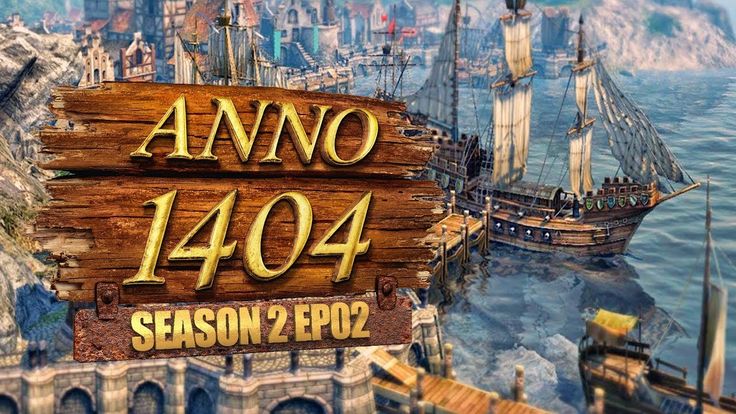
 The places of sunrise of two
The places of sunrise of two